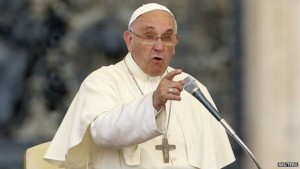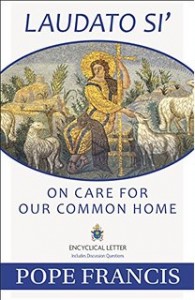On Thursday 18 June the Vatican issued the Encyclical Letter of Pope Francis titled ‘On Care for our Common Home’. There has been much comment on the news and social media about this papal statement, not least from climate change commentators, communicators and policy advocates welcoming the Pope’s engagement with the issue. I plan to write a longer essay about the Encyclical in due course, but in this short blog post I want to ask whether this Papal intervention really is about climate change – or about something else.
By Mike Hulme, professor of climate and culture, www.mikehulme.org, King’s College London
On Thursday 18 June the Vatican issued the Encyclical Letter of Pope Francis titled ‘On Care for our Common Home’. There has been much comment on the news and social media about this papal statement, not least from climate change commentators, communicators and policy advocates welcoming the Pope’s engagement with the issue. I plan to write a longer essay about the Encyclical in due course, but in this short blog post I want to ask whether this Papal intervention really is about climate change – or about something else.
The full title of the Encyclical is “Laidato Si’: On Care for our Common Home”. Laudato Si’ – meaning ‘Praise be to you’ – is taken from a canticle of the 13th century Saint Francis of Assisi. This is an appropriate source of inspiration for the Argentinian Pope who deliberately took upon himself the name of Francis, thereby drawing attention to a rich and long tradition of Catholic teaching and practice about respect for the natural world.
Many climate change policy advocates have welcomed the Papal Encyclical, hoping that it may offer a decisive intervention from a ‘person of significance’ to change attitudes, behaviours and policies with regard to climate change. Such reasoning extends the series of such popular hopes which can be traced back now well over a decade.
I can remember similar sentiments being voiced in 2004 when climate change first received the Hollywood treatment with the movie The Day After Tomorrow. And they continued with Al Gore’s 2006 movie An Inconvenient Truth, with the award of the Nobel Peace Prize in 2007 jointly to the IPCC and Al Gore, with the arrival of the new ‘progressive’ President of the United States Barrack Obama at COP15 in Copenhagen, with the award-winning novelist Ian McEwan tackling climate change in his 2010 novel Solar and with the hoped-for impact on American public opinion following Superstorm Sandy in autumn 2012.
As frustration with the apparent failures of intergovernmental climate negotiations has mounted, so campaigners and advocates have sought to place their faith in a widening range of cultural interventions and moments of decision. The forthcoming international climate meeting in Paris in December, COP21, is another such moment. These, interventions, such advocates hope, will turn the tide of battle in the war against climate change.
And now the Pope.
But I am not so sure that On Care For Our Common Home should be seen in this way. Pope Francis is not a science communicator. Neither is he an entertainer, policy advocate or climate campaigner. And his Encyclical is not really about climate change. Yes, he talks for example about the ‘disturbing warming of the climate system’ and about potential future climatic risks. But he talks a lot more about the needs of the poor, about the Janus face of technology and of a call for justice inspired by the character of God and a suffering Christ. Climate is mentioned just 14 times in the 35,000 words; the poor 59 times.
What is important in this Encyclical therefore is not so much the Pope’s comments about the reality of (human-caused) climate change nor about limiting global warming to two degrees (in fact he says nothing about this policy goal). What is far more important is the way in which he develops an account of what is means to be human, to be made in the image of God. He re-emphasises a vision of human dignity, responsibility and purpose, drawing upon the rich traditions of Catholic theology and ethics.
His Encyclical offers a powerful critique not simply of climate change but of the world we have made for ourselves. It is a world driven by a distorted techno-economic paradigm, in which the poor are marginalised, solidarity is undermined and greed triumphs over justice. It is in opposition to a world modelled for us by the person of Christ.
Pope Francis offers a holistic narrative of the human condition which embraces science, but is hardly driven by it. It places concerns about the integrity of ecosystems and social justice (‘planetary boundaries’ and sustainable development if you will) within a more capacious and integrated worldview. It is a worldview which recognises both the material and the spiritual, the human capacity for ingenuity and our propensity for greed and oppression.
What is being offered in On Care for our Common Home then is a powerful story – a meta-narrative – about what it means to be human. Concerns about technology, water, power, climate, slavery, biodiversity and greed are woven together into an inspirational account of goodness and healthy human living. It escapes the confines of narrowly-drawn science and economics and shows the power, vitality and inspiration of a Christian worldview.
The importance of creating or re-discovering meaningful stories which make sense of climate change according to motivational cultural and religious beliefs is being increasingly recognised. (See COIN’s report ‘A new conversation with the centre right about climate change’ and Candis Callison’s book ‘How climate change comes to matter: the communal life of facts’).
As the Alliance of Religions and Conservation remarked nearly a decade ago, “Without narrative, few people are ever moved to change or adapt. The faiths have been masters of this for centuries.” By offering such a narrative—which isn’t about climate change but which makes sense of it – the Pope’s Encyclical draws our attention back to the important role religion can play in public life.


After a few minutes I read this article there are some things that I am not clear on what the sentence means if it can be explained in another article
I appreciate the detailed explanation of the causes and effects of climate change. However, I’m curious to know if there are concrete steps that can be taken by governments and international institutions to effectively address this climate change issue?
This article emphasizes the importance of adopting renewable energy in reducing greenhouse gas emissions. However, I’m interested to learn more about the potential challenges in transitioning fully to renewable energy and how we can overcome those challenges.
I’m impressed by the efforts made by some countries in reducing greenhouse gas emissions. However, how can we ensure that these measures are widely and equitably implemented worldwide? How can we encourage other countries to take similar actions?
This article provides a clear overview of the impacts of climate change on our environment and lives. However, I’m curious to know what individuals can do in their local communities to participate in environmental protection initiatives and reduce their carbon footprint?
Thank for the information, please visit
VisitUs